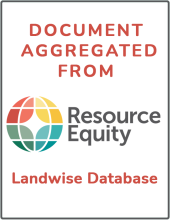/ library resources
Showing items 64 through 72 of 73418.LandLibrary Resource
31 Diciembre 2003
LandLibrary Resource
31 Diciembre 2003
LandLibrary Resource
30 Septiembre 2014
On September 23, at the United Nations Climate Summit, leaders representing governments, the private sector, and civil society announced that they would join the Global Alliance for Climate-Smart Agriculture (CSA) – a voluntary, farmer-led, multi-stakeholder, action-oriented coalition committed t
LandLibrary Resource
31 Diciembre 2003
Nicaragua
LandLibrary Resource
31 Diciembre 2003
LandLibrary Resource
31 Diciembre 2003
Paginación
Land Library Search
Through our robust search engine, you can search for any item of the over 64,800 highly curated resources in the Land Library.
If you would like to find an overview of what is possible, feel free to peruse the Search Guide.


